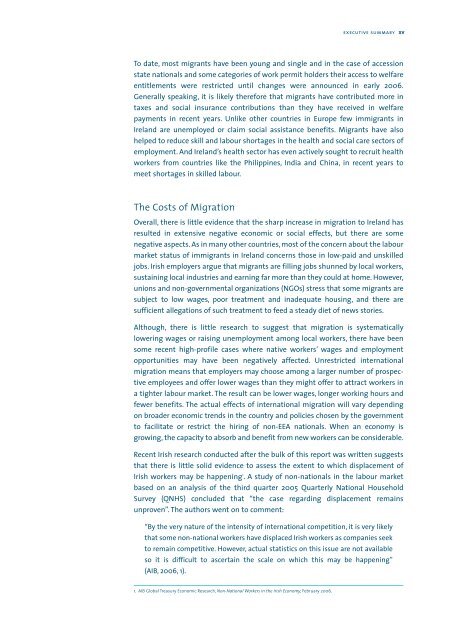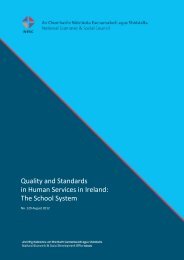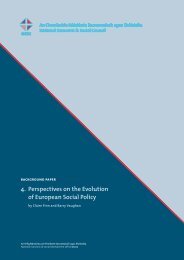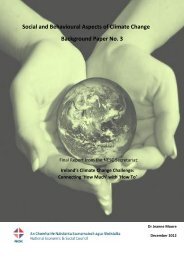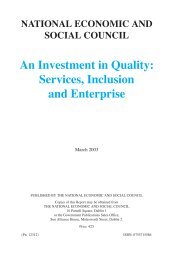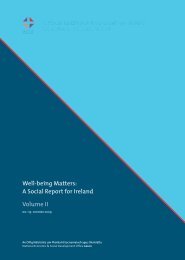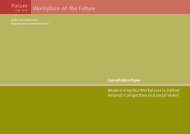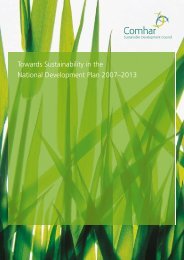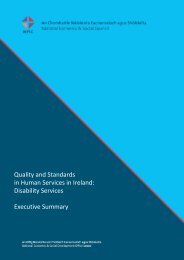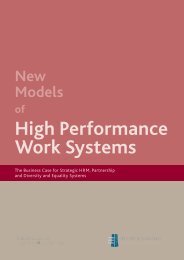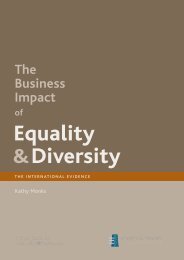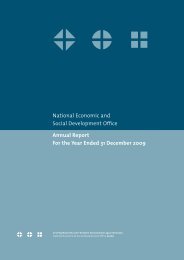Managing Migration in Ireland - European Commission - Europa
Managing Migration in Ireland - European Commission - Europa
Managing Migration in Ireland - European Commission - Europa
You also want an ePaper? Increase the reach of your titles
YUMPU automatically turns print PDFs into web optimized ePapers that Google loves.
executive summaryxvTo date, most migrants have been young and s<strong>in</strong>gle and <strong>in</strong> the case of accessionstate nationals and some categories of work permit holders their access to welfareentitlements were restricted until changes were announced <strong>in</strong> early 2006.Generally speak<strong>in</strong>g, it is likely therefore that migrants have contributed more <strong>in</strong>taxes and social <strong>in</strong>surance contributions than they have received <strong>in</strong> welfarepayments <strong>in</strong> recent years. Unlike other countries <strong>in</strong> Europe few immigrants <strong>in</strong><strong>Ireland</strong> are unemployed or claim social assistance benefits. Migrants have alsohelped to reduce skill and labour shortages <strong>in</strong> the health and social care sectors ofemployment. And <strong>Ireland</strong>’s health sector has even actively sought to recruit healthworkers from countries like the Philipp<strong>in</strong>es, India and Ch<strong>in</strong>a, <strong>in</strong> recent years tomeet shortages <strong>in</strong> skilled labour.The Costs of <strong>Migration</strong>Overall, there is little evidence that the sharp <strong>in</strong>crease <strong>in</strong> migration to <strong>Ireland</strong> hasresulted <strong>in</strong> extensive negative economic or social effects, but there are somenegative aspects. As <strong>in</strong> many other countries, most of the concern about the labourmarket status of immigrants <strong>in</strong> <strong>Ireland</strong> concerns those <strong>in</strong> low-paid and unskilledjobs. Irish employers argue that migrants are fill<strong>in</strong>g jobs shunned by local workers,susta<strong>in</strong><strong>in</strong>g local <strong>in</strong>dustries and earn<strong>in</strong>g far more than they could at home. However,unions and non-governmental organizations (NGOs) stress that some migrants aresubject to low wages, poor treatment and <strong>in</strong>adequate hous<strong>in</strong>g, and there aresufficient allegations of such treatment to feed a steady diet of news stories.Although, there is little research to suggest that migration is systematicallylower<strong>in</strong>g wages or rais<strong>in</strong>g unemployment among local workers, there have beensome recent high-profile cases where native workers’ wages and employmentopportunities may have been negatively affected. Unrestricted <strong>in</strong>ternationalmigration means that employers may choose among a larger number of prospectiveemployees and offer lower wages than they might offer to attract workers <strong>in</strong>a tighter labour market. The result can be lower wages, longer work<strong>in</strong>g hours andfewer benefits. The actual effects of <strong>in</strong>ternational migration will vary depend<strong>in</strong>gon broader economic trends <strong>in</strong> the country and policies chosen by the governmentto facilitate or restrict the hir<strong>in</strong>g of non-EEA nationals. When an economy isgrow<strong>in</strong>g, the capacity to absorb and benefit from new workers can be considerable.Recent Irish research conducted after the bulk of this report was written suggeststhat there is little solid evidence to assess the extent to which displacement ofIrish workers may be happen<strong>in</strong>g 1 . A study of non-nationals <strong>in</strong> the labour marketbased on an analysis of the third quarter 2005 Quarterly National HouseholdSurvey (QNHS) concluded that “the case regard<strong>in</strong>g displacement rema<strong>in</strong>sunproven”. The authors went on to comment:“By the very nature of the <strong>in</strong>tensity of <strong>in</strong>ternational competition, it is very likelythat some non-national workers have displaced Irish workers as companies seekto rema<strong>in</strong> competitive. However, actual statistics on this issue are not availableso it is difficult to ascerta<strong>in</strong> the scale on which this may be happen<strong>in</strong>g”(AIB, 2006, 1).1. AIB Global Treasury Economic Research, Non-National Workers <strong>in</strong> the Irish Economy, February 2006.


